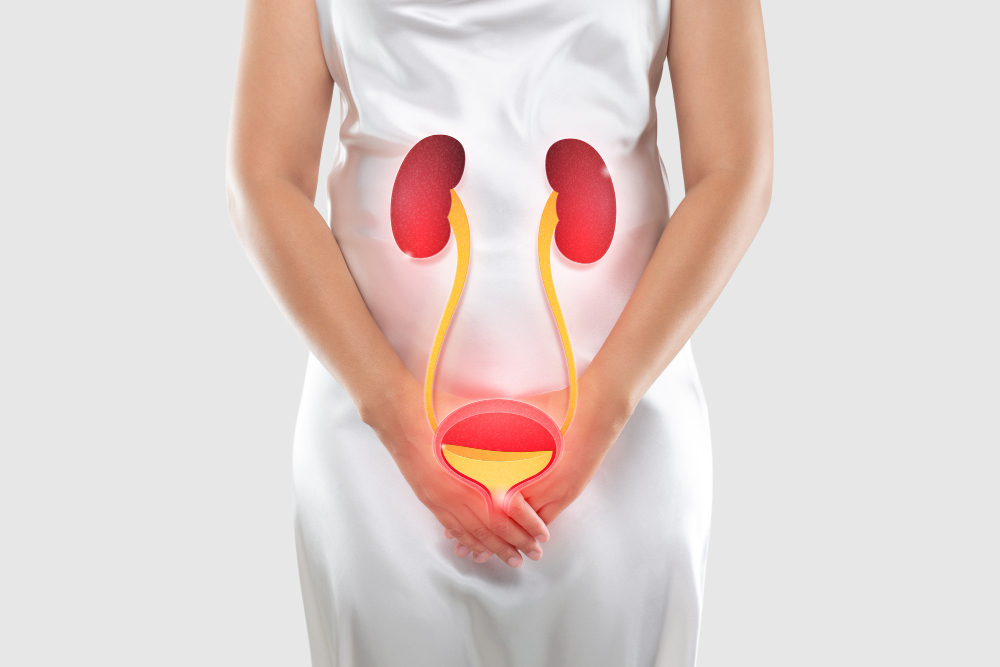
What is Urinary Tract Infection?
Urinary Tract Infection (UTI) is a bacterial infection that can affect any part of the renal tract (kidneys, ureters, bladder and urethra). Most frequently, UTI is termed cystitis, as it is localised to the urethra and bladder. Occasionally, it ascends to the kidneys (causing pyelonephritis).
What Causes Urinary Tract Infection?

Women are most at risk of getting a UTI, with approximately 50% of them experiencing a Urinary Tract Infection at least once in their lifetime. This is because of a much shorter urethra compared to men, the close proximity of the anus to the urethra and the humid and moist conditions present. Certain ladies with incomplete emptying of the bladder also have a higher risk of UTI, as the residual urine becomes rapidly infected. Sexual intercourse increases UTI risk (honeymoon cystitis), due to local irritation and trauma; and the use of spermicide adds to increased risk of infection. Diseases that impair the immune system (like diabetes mellitus) or certain medications that suppress the immune system (eg. chemotherapy agents) also increase risk; as well as prolonged use of catheters, or the presence of bladder stones.
Symptoms of UTI
The symptoms of an Urinary Tract Infection may vary depending on which part of the urinary tract is affected. However, some common symptoms include:
- strong urgency to urinate
- hesitancy
- pain or burning sensation during urination
- dysuria with lower abdominal pain/discomfort
- passing small amounts of urine frequently
- cloudy or foul odour to the urine
- possible blood in the urine
In some cases, an individual may also experience fever, chills, and lower abdominal discomfort.
It is crucial to seek medical attention if you experience any of these symptoms as untreated UTIs can lead to more severe complications such as kidney infections or sepsis.
Diagnosis and Treatment
If you suspect that you have a UTI, your doctor will perform a physical exam and request a urine sample for analysis. The urine sample will be tested for the presence of bacteria, white blood cells, and red blood cells, which can indicate an infection.
If the test results confirm a UTI, your doctor will likely prescribe antibiotics to kill the bacteria causing the infection. It is essential to complete the full course of antibiotics as prescribed by your doctor to ensure that the infection is fully treated.
Recurrent of Urinary Tract Infection
If a Urinary Tract Infection occurs three or more times in a year, it is considered as a recurrent Urinary Tract Infection, and is caused by uropathogenic bacteria that make their home in the large intestine. The commonest infectious bacteria is the E. coli species, but there are other bacteria that can also cause UTI.
The type of bacteria, and more importantly the antibiotic sensitivities, can be deduced from urine microscopy and culture testing. In recurrent cases, there may be a need for further testing, including ultrasound scans and cystoscopy.
A course of appropriate antibiotics and preventive measures to treat and reduce the risk of recurrence usually will handle most UTI, although longer term suppression antibiotics may be required for RUTI.
Prevention
While UTIs can be treated with antibiotics, prevention is always better than cure. Here are some tips to help prevent Urinary Tract Infections:
- Drink plenty of water: Staying hydrated helps flush out bacteria from the urinary tract.
- Urinate after sex: As mentioned earlier, sexual activity can introduce bacteria into the urinary tract, so it is essential to urinate after sex.
- Practise good hygiene: Wiping from front to back after using the bathroom can help prevent bacteria from entering the urethra.
- Avoid irritating products: Certain types of birth control methods and feminine hygiene products can irritate the urinary tract, making it more susceptible to infections.
For individuals who experience recurring UTIs, your doctor may recommend lifestyle changes or prescribe preventive medication. It is crucial to follow your doctor’s instructions and continue with any prescribed preventive measures to reduce the risk of future UTIs.
UTIs can have a significant impact on an individual’s daily life. The discomfort and pain associated with the infection can be debilitating, and if left untreated, it can lead to severe complications. If you experience any symptoms of a UTI, do not hesitate to make an appointment with our doctor.
Remember, your health is essential, and Dr Arthur Tseng is here to help you maintain a healthy urinary tract.
Disclaimer: The information provided in this article is for general purposes only and should not be considered as a substitute for medical advice. Always consult with your healthcare provider before making any changes to your current treatment plan or starting any new medications.

